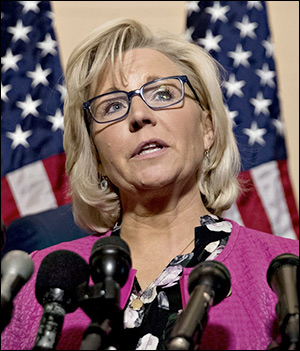By Jim Ellis — Thursday, Dec. 7, 2023
President

Former Rep. Liz Cheney (R) was one of 10 Republican House members who voted to impeach former President Donald Trump.
While Cheney didn’t declare her candidacy, she might find the ballot qualification obstacles much more formidable than she might believe. Not representing a political party with ballot status, an Independent must navigate 51 different requirement systems to earn a nationwide ballot line. This realization will likely discourage several of the candidates who are looking to launch non-affiliated presidential efforts.
House
Illinois: Candidate Filing Closes — Candidate filing for the Illinois March 19 primary has concluded, and several points of note are present. With no Senate race in Illinois this year, the focus of attention will be the presidential race and the US House campaigns as well as other down ballot Land of Lincoln campaigns.
Four delegation incumbents drew no major party general election opposition. Reps. Jesue “Chuy” Garcia (D-Chicago), Jan Schacowsky (D-Evanston), Mary Miller (R-Oakland), and Darin LaHood (R-Peoria) look to have free rides in the general election. Reps. Miller and LaHood also drew no primary opponent.
Rep. Danny Davis (D-Chicago), running for a 15th term, has five Democratic primary opponents. While the effort against him is serious considering his 2022 renomination percentage was only 51.9, the fact that so many people are on the ballot will split the anti-Davis vote and allow him to win renomination with plurality support. Rep. Mike Bost (R-Murphysboro) sees a primary battle emerging from the party’s 2022 gubernatorial nominee, former state Sen. Darren Bailey.
The most competitive general election race looks to be in the Quad Cities area of western Illinois where freshman Rep. Eric Sorensen (D-Moline) is likely to face retired circuit judge Joe McGraw (R).
NY-3: Democrats Want More Time to Pick Nominee — A bit of a political surprise has occurred on Long Island. Tuesday was the planned day that former Rep. Tom Suozzi (D) was scheduled to be presented as the party’s special election nominee to replace expelled Rep. George Santos (R). While Nassau County chairman Jay Jacobs has a virtual monopoly on naming the nominee, he says more time is required to consult with party leaders on the county committee, in addition to US House Minority Leader Hakeem Jeffries (D-Brooklyn), and other prominent Democrats.
Jacobs, who is also the New York State Democratic Committee chairman, further said that the nomination is not a “lock” for any candidate and that contenders in addition to Suozzi are being interviewed before the party committee structure. Republicans are going through the same process. Gov. Kathy Hochul (D) set the 3rd District special election for Feb. 13.
NC-10: Rep. Patrick McHenry to Retire — House Financial Services chairman Patrick McHenry (R-Lake Norman), who is the Speaker Pro Tempore and presided over the election of Speaker Mike Johnson, announced Tuesday that he will not seek an 11th term in the House next year. Term-limited in his chairmanship even if the Republicans hold the majority, Rep. McHenry, still only 48 years old, will end his congressional tenure after 20 years in office.
The McHenry retirement means that 34 seats and counting will be open for the next election. NC-10 should remain safely in Republicans hands (Dave’s Redistricting App calculates a 56.6R – 41.3D partisan lean), so the battle to succeed the retiring congressman will lie in the Republican primary. The North Carolina primary is scheduled for Super Tuesday, March 5. If no one reaches 30 percent of the vote, a runoff election will be held on May 14.



